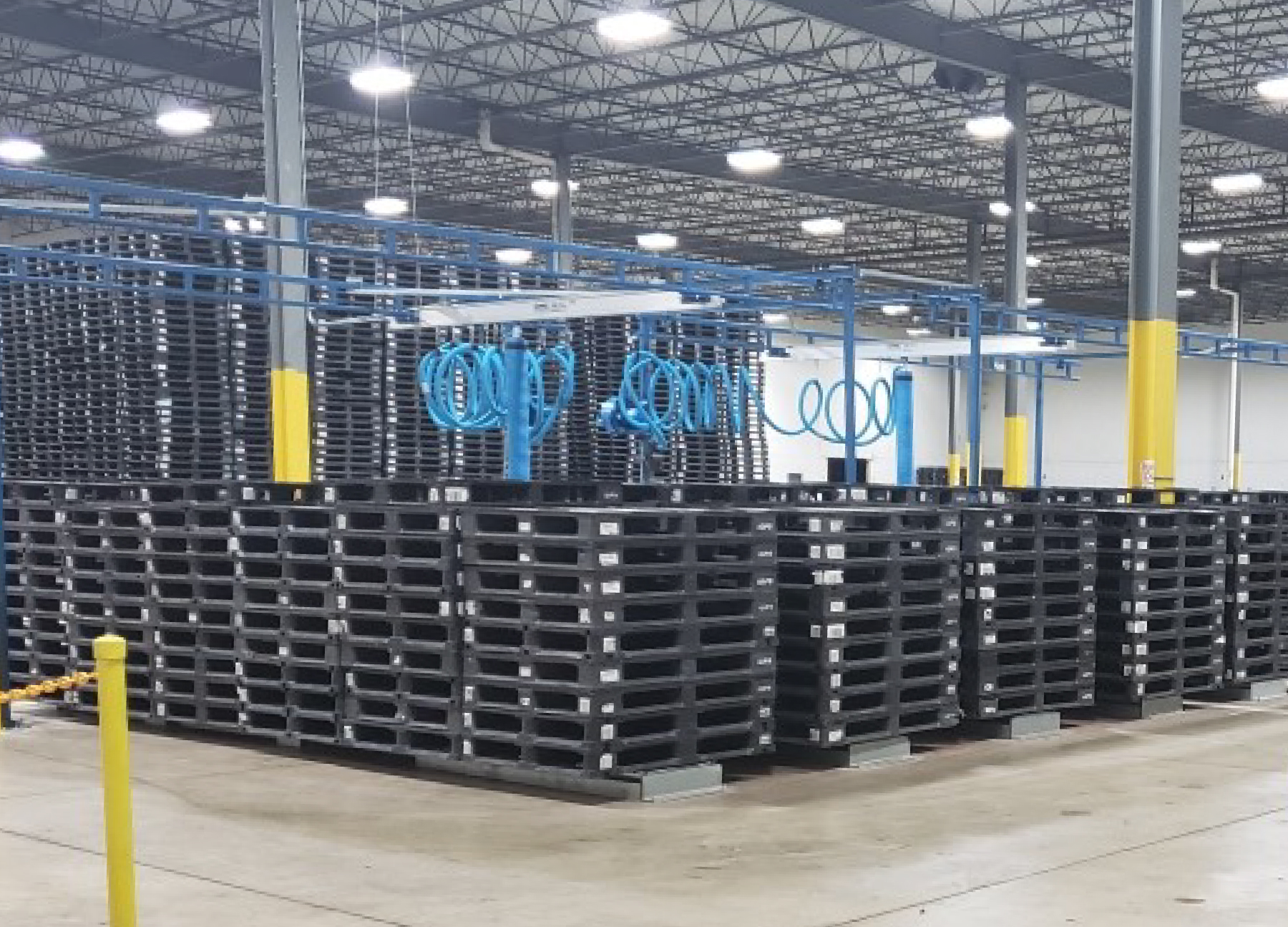ARTICLE UPDATED ON FEBRUARY 1, 2024
Though often overlooked, pallets are silent powerhouses underpinning the vast U.S. supply chain. Each year, millions of new pallets are produced to replace those lost or damaged in transit. There are currently more than 1.8 billion pallets constantly in motion across the country. This massive flow presents a significant challenge for businesses, requiring efficient systems to track and manage their pallet inventory. Even a single manufacturer or distributor can handle hundreds of thousands of pallets at a time, necessitating robust inventory management strategies to ensure optimal utilization and minimize operational disruptions.
Managing pallet inventory can be complex and costly, often leading companies to prioritize readily available pallets over long-term efficiency. This “disposable” approach, characterized by one-way shipments and subsequent abandonment, proves convenient for short-lived pallets but carries significant drawbacks.
A primary concern is the impact of product damage. Big box retailers are increasingly demanding higher-quality pallets, such as block pallets exceeding Grocery Manufacturers Association (GMA) standards. These sturdier pallets, while reducing product damage during shipping and making handling safer, come at a higher price, rendering them unsuitable for disposal.
The rising demand for long-lasting pallets, paired with the high cost of disposables, is prompting businesses to rethink how they handle pallet management. Establishing systems to track, reuse, and repair pallets enables businesses to maximize their investment, minimize waste, and guarantee goods’ secure and efficient delivery.
The Challenges of Managing Pallet Inventory

Effective pallet reuse requires companies to tackle key challenges like transportation logistics, and efficient tracking systems. Companies seeking to reuse pallets in their inventory should consider implementing the following:
- Recovery: Getting pallets back to the manufacturer for another round of duty is more complex than it seems. Headaches include managing the paperwork involved in keeping track of where every single pallet is and knowing when enough have piled up in one place to make sending a truck for them worthwhile. Overcoming the administrative burden of managing and optimizing pallet retrieval is crucial for successfully implementing reuse programs.
- Sorting: As the retrieved pallets arrive, the sorting dance begins. A keen eye is needed to distinguish the ones still fit for duty from those who have seen better days. The broken pallets then enter their sorting round, where they could either be repaired or retired.
- Repair: Repairing damaged pallets that can be salvaged involves replacing broken boards or reinforcing weakened sections. Though not a highly intricate task, it demands employees with skills in safely using tools, adequate wages, necessary equipment, and a suitable facility for performing the repairs.
- Storage: Safely storing pallets presents a challenge due to their bulkiness. This necessitates a significant amount of space within production facilities or in a designated storage area, requiring transportation to move pallets to their designated locations.
- Disposal: Even the sturdiest pallets eventually reach the end of their journey. When they’re too damaged to be repaired, supply chain managers dispose of them. For wood pallets, this can mean disposing of the pallets at a local landfill. In some cases, another option involves removing nails and screws and turning the pallets into mulch or wood filler. While it requires additional effort, this approach keeps wood pallets from being dumped in landfills and provides a chance for them to be useful again.
The steps outlined above underscore the considerable costs associated with pallet inventory management — especially for wood pallets, which are heavy and can’t be recycled. In an internal company pallet pool, pallets become additional commodities, demanding dedicated transportation and maintenance facilities. Offering such services constitutes a substantial investment in time and money, usually feasible only for companies handling large product volumes nationwide. Consequently, many businesses still opt for stringer pallets, using them once and then discarding them; but this wastes resources and money. For many companies, the solution lies in partnering with specialized pallet pooling services to handle their inventory.
Outsourcing Pallet Management with a Pooling Service

Opting for a pallet pooling service allows companies to enjoy the benefits of a well-managed pallet inventory without the headaches and costs of running their own pool. Businesses simply receive the pallets they’ve ordered when needed, while the pooling service handles transportation, repairs, and cleaning.
In the past, there were only a few pallet pooling services, mostly offering wood block pallets within a handful of programs. Recently, however, there’s been a surge in new pallet pooling programs introducing different pallet types. Companies now lean towards engineered products with consistent dimensions and dependable strength to enhance supply chain automation. This demand has given rise to plastic pallets that outshine wood pallets in strength and reliability, boasting predictable weights and dimensions. Unlike their wood counterparts, which are prone to breakage or loose boards, plastic pallets have a solid construction. Their design eliminates the need for fasteners like nails and screws, reducing the risk of snagging and product damage in warehouses. These advantages result in less product damage and provide a more sustainable and hygienic alternative to wood pallets.
iGPS plastic pallets help managers outsource pallets by providing a sanitary, trackable platform for carrying products. For more information, contact us at 1-800-884-0225, email a specialist at [email protected], or visit our contact page.



